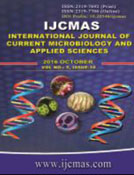


 National Academy of Agricultural Sciences (NAAS)
National Academy of Agricultural Sciences (NAAS)

|
PRINT ISSN : 2319-7692
Online ISSN : 2319-7706 Issues : 12 per year Publisher : Excellent Publishers Email : editorijcmas@gmail.com / submit@ijcmas.com Editor-in-chief: Dr.M.Prakash Index Copernicus ICV 2018: 95.39 NAAS RATING 2020: 5.38 |
The resistance of microorganisms generated a loss of effectiveness of antibiotics. In Côte d’Ivoire, peppers, adjuvant in traditional medicine to treat many infections based on little scientific arguments. This present study aims to evaluate the in vitro antimicrobial activity of pepper on microorganisms of different profiles. Extracts were tested on the growth of strains (ATCC) and multiresistant clinical. The Gram positive have MIC and MBC respectively vary from 36-620 μgmL-1 and 78-620 μgmL-1. Multidrug resistant have MIC and MBC, very high compared to ATCC strains (78-2500 μgmL-1). The MIC and MBC of Gram-negative, respectively vary from 64-620 μgmL-1 and 130-1250 μgmL-1. The clinics have very high MIC and CMB, sometimes out of the range of concentrations tested. S. aureus (KTG, MLS) E. faecalis (PRKRANR ), E. coli (ESBL KTNet) and P. aeruginosa (ESBL KTG) were the least sensitive to different extracts. The MIC fungal range from 78-100 μgmL-1 strain ATCC against 100-620 μgmL-1 for the clinic. This study confirms the effectiveness of traditional herbal peppers (Capsicum) in the treatment of certain microbial infections. Peppers could be a promising natural resource for the exploration of new active molecules.
 |
 |
 |
 |
 |